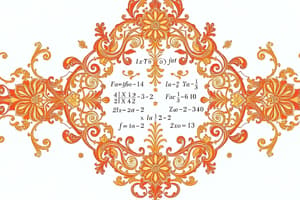Podcast
Questions and Answers
What is the main focus of algebra?
What is the main focus of algebra?
Dealing with symbols and their relationships rather than concrete numbers.
Give an example of an algebraic expression.
Give an example of an algebraic expression.
3x + 5y
What does linear algebra focus on?
What does linear algebra focus on?
Solving systems of linear equations.
What type of expressions does quadratic algebra focus on?
What type of expressions does quadratic algebra focus on?
How can algebraic expressions be manipulated?
How can algebraic expressions be manipulated?
What are some unique properties of quadratic expressions?
What are some unique properties of quadratic expressions?
Define polynomial algebra and provide an example of a polynomial expression.
Define polynomial algebra and provide an example of a polynomial expression.
How can algebraic manipulations be used in solving linear equations?
How can algebraic manipulations be used in solving linear equations?
What are some applications of algebra in different fields?
What are some applications of algebra in different fields?
Why is algebra considered a cornerstone of mathematics?
Why is algebra considered a cornerstone of mathematics?
Flashcards are hidden until you start studying
Study Notes
Exploring Algebra: The Mathematical Cornerstone
On this enlightening journey into the world of mathematics, we'll be focusing on algebra, a subject that plays a pivotal role in solving various types of mathematical problems and logical puzzles. Algebra is a diverse and creative discipline that enables us to express, analyze, and manipulate mathematical expressions and equations in a systematic and logical manner.
What is Algebra?
Algebra is a branch of mathematics that deals with symbols and their relationships, rather than concrete numbers. It's a language that enables us to describe relationships between variables and to solve equations and systems of equations. Algebraic expressions involve symbols such as x, y, z, and a, b, c, standing for numbers or unknown quantities.
Algebraic Expressions
An algebraic expression, like 3x + 5y or x^2 - 2x + 1, is a combination of constants and algebraic symbols. These expressions can be manipulated using various rules and operations such as addition, subtraction, multiplication, and division.
Linear Algebra
Linear algebra extends algebraic concepts to solve systems of linear equations, which consist of two or more equations with two or more variables each. Linear algebra is a powerful tool for analyzing data, designing algorithms, and solving a wide range of real-world problems.
Quadratic Algebra
Quadratic algebra focuses on quadratic expressions of the form ax^2 + bx + c, where a, b, and c are constants. Quadratic expressions have unique properties, such as having a maximum or minimum point, a vertex, and an axis of symmetry. Solving quadratic equations and inequalities is often a critical step in solving more complex problems.
Polynomial Algebra
Polynomials are expressions of the form a_nx^n + a_(n-1)x^(n-1) + ... + a_1x + a_0, where n is a non-negative integer and a_i are constants. Polynomial algebra is a vital branch of algebra that involves discovering polynomial properties, such as roots and coefficients, and solving polynomial equations.
Algebraic Manipulations
Algebraic manipulations involve using algebraic rules and properties to simplify expressions, solve equations, and extract relevant information. For instance, when solving linear equations, we can use substitution, elimination, or addition and subtraction of equations to find the solutions for the unknown variables.
Applications of Algebra
Algebra has broad applications in various fields. For instance, it's used in physics to describe the behavior of particles, in chemistry to understand chemical reactions, and in engineering to design and analyze structures. Algebraic thinking is an essential skill for problem-solving in mathematics and many other fields.
Conclusion
Algebra is a cornerstone of mathematics that enables us to solve problems and analyze relationships between variables. It's a fascinating and creative subject that empowers us to discover complex patterns and make predictions about the natural and artificial world. By mastering algebra, we can develop a deep understanding of the mathematical concepts that underpin our world and improve our problem-solving skills.
Studying That Suits You
Use AI to generate personalized quizzes and flashcards to suit your learning preferences.




